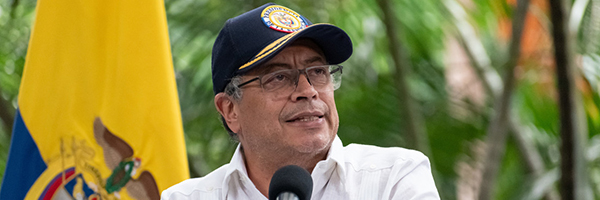Lawfare, Smear Campaigns, and Lies in Colombia
 Carmen Parejo Rendón, Orinoco Tribune, October 16, 2024 —
Carmen Parejo Rendón, Orinoco Tribune, October 16, 2024 —
Since Gustavo Petro’s victory in Colombia, his government’s path has not been easy. Virtually all the social reforms presented by the president—those included in his electoral program—have been overturned by other political forces.
Among his proposals, the health reform stands out. It is very necessary in a country like Colombia, where access to medicine is part of the social geography of inequality, especially between urban and rural areas.
These setbacks contrast with the hope that surrounded the unprecedented arrival to power of a leftist politician, which was celebrated in a country that suffers from high rates of violence and severe inequalities in all areas.
A political war was started against President Petro, as was a media war. The concentration of Colombian media in a few hands, most of them in the hands of the oligarchy —and of transnational communication companies such as the Prisa Group (Spain), owner of Caracol and other media— that feared losing control over the country’s resources and activated an intense campaign to discredit the president.
In the open war against Petro, Colombian journalists such as Vicky Dávila, from Revista Semana, or Néstor Morales, from Blu Radio, have stood out. Following in the footsteps of the international far-right media, they have been broadcasting hoaxes and campaigns against the president for two years. They have not provided evidence, and when they are proven wrong, they do not provide rectifications.
These journalists have even created scenarios of confusion that hide the real scandals of Colombian politics, including the interests and administrative irregularities that affect these large media outlets.
In the midst of this scenario, we finally arrive at the decision of the National Electoral Council (CNE) to formulate charges against Petro’s presidential campaign on October 8.
The Colombian Constitution establishes that the CNE only has one month after the elections to begin an investigation into any anomaly that it considers to have taken place during the electoral period, both in the campaign and in the voting. In this case, two years have passed.
The economic contributions for which the CNE is urging an investigation do not really correspond to the campaign but to the resources received by one of the parties, Colombia Humana, which was part of the electoral coalition.
In this sense, there would be no irregularity, according to what is established by the Colombian laws on financing political parties, since the amount that the Colombia Humana party allegedly received corresponds to the resources that were used for the party celebrating the electoral victory, that is, facts unrelated to the financing of the campaign, as Petro himself has clarified.
One of the contradictions of the CNE is that it does not have the authority to open any type of investigation, even less so two years after the elections.
Similarly, the CNE does not have the authority to open any type of investigation against the president. The House of Representatives would have to authorize an investigation into the presidential jurisdiction. For the moment, this has not happened.
Considering these facts, we can intuit that “lawfare” will be the next step of the Colombian right wing in its campaign to overthrow Petro and prevent any social reform in the country.
Although this mechanism of judicial warfare to overthrow politicians who represent alternatives is not exclusive to Latin America, it is necessary to take into account that it is in this territory where it has developed most effectively in recent years.
Taking a quick look, we can recall other cases such as the lawfare against López Obrador when he was mayor of Mexico City, the dismissal of Dilma Rousseff and the imprisonment of Lula da Silva in Brazil, the judicial attacks against Cristina Fernández in Argentina, the siege against Rafael Correa in Ecuador, or the use of this tool to “legalize” coups d’état, as occurred in Honduras, Paraguay, or Bolivia.
In addition, the actions against Petro occur in a specific regional scenario. On October 9, the US State Department included former president of Ecuador Rafael Correa, along with his wife and children (something unusual), on the list of those not eligible to access a US visa. Similarly, this measure was applied to former vice president of Ecuador Jorge Glas, who is currently abducted by the Ecuadorian state, which has even prevented contact with his legal team, after the illegal invasion of the public force—under the command of Daniel Noboa—of the Mexican embassy, where Glas was in asylum.
Likewise, all the destabilization strategies against Venezuela remain active since the coup attempt carried out during the presidential elections of July of this year.
The offensive against Petro is built like a pyramid. At the base is the Colombian oligarchy, which refuses any social reform that questions its privileges. On top of that, the fear of Latin American integration is found, an element that would guarantee political sovereignty against the attacks of the national oligarchies and their international masters. Finally, the apex is nothing more than the need of the US to keep under control what it considers its “backyard,” especially in a general scenario that questions, more and more deeply, US international hegemony.
